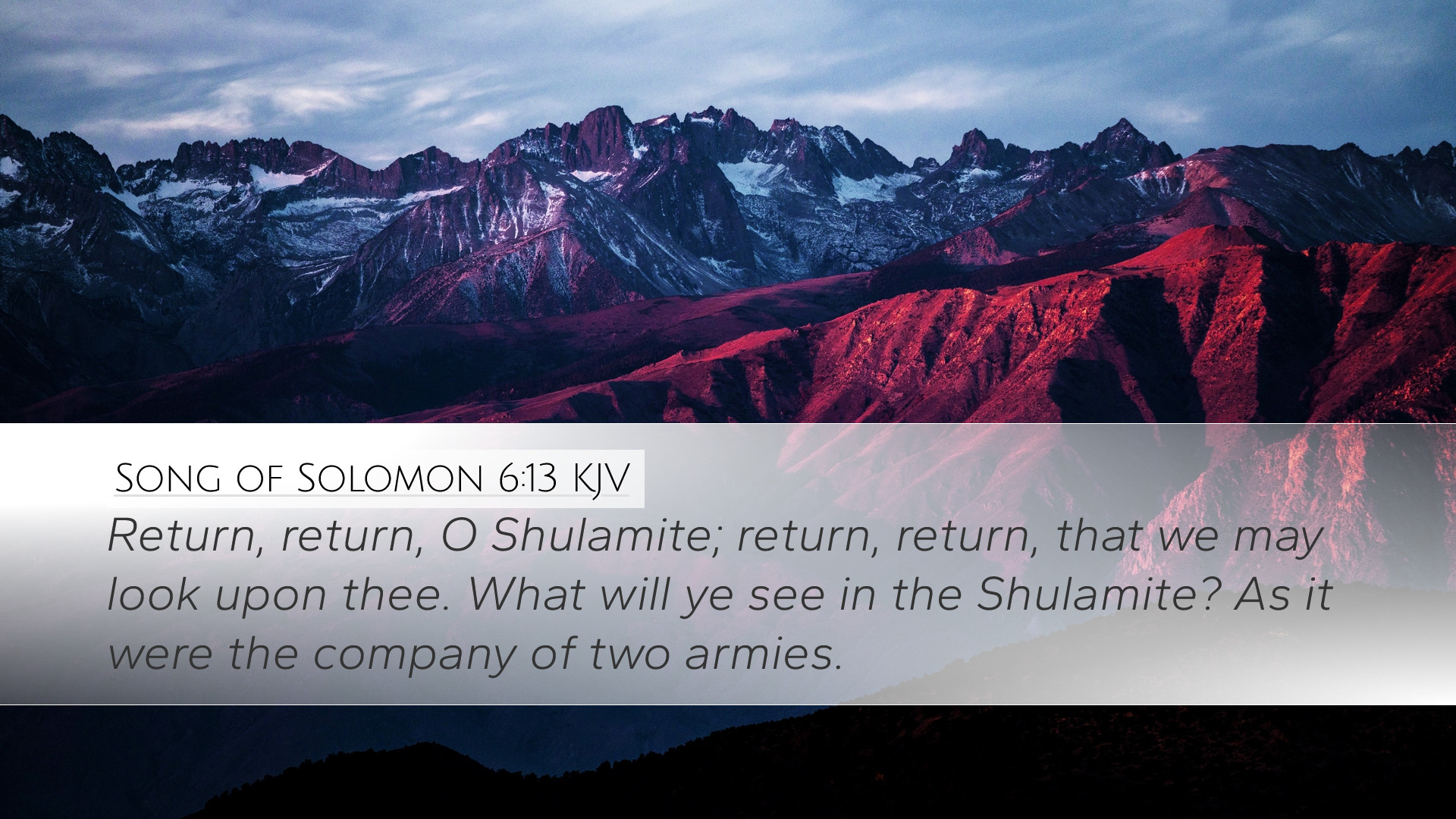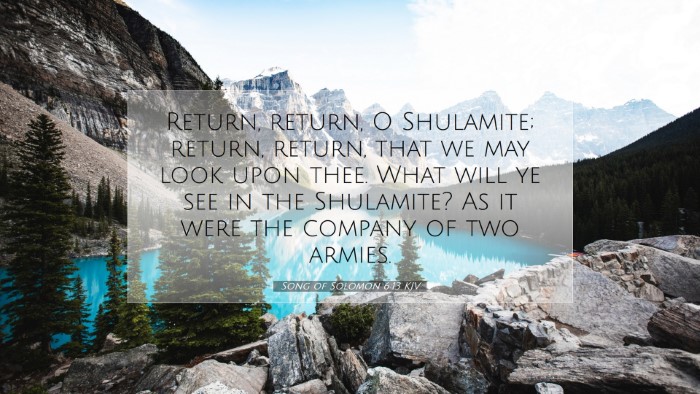Old Testament
Genesis Exodus Leviticus Numbers Deuteronomy Joshua Judges Ruth 1 Samuel 2 Samuel 1 Kings 2 Kings 1 Chronicles 2 Chronicles Ezra Nehemiah Esther Job Psalms Proverbs Ecclesiastes Song of Solomon Isaiah Jeremiah Lamentations Ezekiel Daniel Hosea Joel Amos Obadiah Jonah Micah Nahum Habakkuk Zephaniah Haggai Zechariah MalachiSong of Solomon 6:13
Song of Solomon 6:13 KJV
Return, return, O Shulamite; return, return, that we may look upon thee. What will ye see in the Shulamite? As it were the company of two armies.
Song of Solomon 6:13 Bible Commentary
Commentary on Song of Solomon 6:13
Verse Reference: Song of Solomon 6:13 (KJV) - "Return, return, O Shulamite; return, return, that we may look upon thee. What will ye see in the Shulamite? As it were the company of two armies."
Introduction
The Song of Solomon, often referred to as the Song of Songs, is a poetic expression of love, beauty, and longing. In the verse of chapter 6, verse 13, we encounter a call for the Shulamite to return, emphasizing themes of attraction and admiration. Esteemed commentators like Matthew Henry, Albert Barnes, and Adam Clarke provide rich insights into this passage, deepening our understanding of the historical, theological, and practical implications of the text.
This verse captures a moment of anticipation and desire. The repetition of "return" underscores the urgency and emotional weight of the plea. The phrase "O Shulamite" denotes a specific personification of beauty and the ideal within love. The reference to "the company of two armies" evokes both the intensity and the grandeur of love, as understood through the lens of conflict and resolution.
Key Themes
- Yearning and Desire: The call for the Shulamite to return suggests a deep longing. The speaker's insistence reflects a spiritual and romantic desire, creating a parallel to the yearning of the bridegroom for his bride, emblematic of the relationship between Christ and the Church.
- Beauty and Admiration: The question, "What will ye see in the Shulamite?" invites contemplation on the nature of beauty and what captures the heart. The Shulamite's beauty, likened to remarkable and powerful imagery, signifies not merely physical attractiveness but an inner beauty that draws admiration.
- Conflict and Resolution: The reference to "the company of two armies" brings forth the notion of love's intensity. It suggests both difficulty and the extraordinary grace that is found within love, highlighting both struggle and the beauty that arises from it.
Commentary Insights
Matthew Henry’s Perspective
Matthew Henry views this passage as an expression of divine love calling the soul back from its wayward paths. He emphasizes that the repetition of "return" signifies a heartfelt plea for reclamation. The mention of the Shulamite characterizes her not only as physically attractive but as a representation of purity and grace. Henry poignantly notes that God's longing for His people mirrors the desire expressed in this verse.
Albert Barnes’ Interpretation
Albert Barnes expands our understanding by suggesting that the Shulamite serves as a typological image of the Church, signifying its beauty in relation to Christ. Barnes highlights the rhetorical question posed in the latter part of the verse, pointing out that this inquiry is a commentary on the nature of divine love and beauty. The notion of "two armies" suggests the complexity of love; it requires effort but brings forth reward in relationship and closeness.
Adam Clarke’s Explanation
Adam Clarke’s commentary touches on the idea of spiritual warfare present in love. He notes that the beauty and appeal of the Shulamite remind believers of the compelling nature of Christ's love for the Church. Clarke emphasizes the significance of seeing beyond mere physicality; the Shulamite's essence represents the whole community of believers who are called to return to their source of love and sustenance, which is God Himself.
Theological Implications
This verse is rich with theological implications, particularly regarding the nature of God’s love, human longing, and the redemptive call. The invitation for return suggests the continual nature of grace, as God persistently calls His people back to Him despite their wandering. The imagery of two armies encapsulates the challenges believers face but also the divine assurance that accompanies a return to the source of love.
Practical Applications
- Personal Reflection: This passage inspires individuals to reflect on their own relationship with God. The repetitiveness of the call to return serves as a reminder of God’s patience and lovingkindness, encouraging believers to renew their commitment and connection to Him.
- Community Engagement: The call for the Shulamite to return indicates a collective aspect to faith. Communities are encouraged to cultivate an environment where returning to God is supported, showing that communal worship and prayer can enhance individual faith journeys.
- Conflict Resolution: Recognizing the metaphor of “two armies,” individuals are reminded that conflicts in relationships, whether with God or others, can lead to growth. Embracing the complexity of relationships encourages a deeper understanding of love’s resilience.
Conclusion
The verse Song of Solomon 6:13 encapsulates profound truths about love, longing, and beauty. Drawing from the insights of public domain commentators, we unearth layers of meaning that resonate with the themes of divine desire and human return. For pastors, students, theologians, and scholars, understanding this passage opens avenues for deeper exploration of God’s love and the transformative power of returning to Him.


